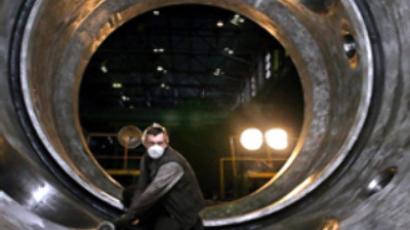Race is on for India nuclear market
Just months after the opening of India to civilian nuclear trade with the world, the country is already shopping. Russia, France and the US are the main rivals in getting billions of dollars worth contracts.
So what are the advantages of each of the sides?
For a long time, when it comes to nuclear energy, Russia has been the only game in town, but recently new players have emerged. Russia now faces competition from France and the United States for Indian business.
While France claims to have the latest technology, Russia is the only one to have already built reactors in India and has an old and close relationship with the Indians.
The US has also recently gained goodwill with India by helping to get the international community’s approval at the International Atomic Energy Agency (IAEA).
Some say it was done with business interests in mind.
“Many people wonder why President Bush signed this agreement with India. There was a lot of pressure on him from the economic lobby and from the commercial lobby,” explains security analyst Shankar Prasad.
But whether the goodwill gained will turn into an advantage, experts feel that when it comes to placing orders India will look out for its interests first.
“I would not say anyone has any more advantage than the other. Let’s be quite clear about it – Indians, especially the Indian government people are very hard negotiators,” says security and defence analyst Jasjit Singh.
Some experts feel that Russia is early in recognising India’s needs and is therefore ahead in the game. Recently it signed up to provide two more reactors at Kudankulam.
“India is not going to sign any contract with the US unless the reprocessing of spent fuel is guaranteed. The Russians have already allowed it in Kudankulam. The French are still dilly-dallying. They have not made up their mind,” says Dr Balachandran from the Institute for Defence Studies and Analysis (IDSA). “So the Russians have a definite advantage over both the French and the US in supplying reactors to India,” he believes.
Some point out that America’s lack of recent experience in building reactors, and baggage from past deals with India are issues they will have to address when negotiating with India.
According to India’s former foreign secretary Lalit Mansingh, there were instances when Americans showed themselves as unreliable suppliers.
“We have had the case of the Tarapur nuclear power station where we had a contract for the Americans to supply fuel and halfway through they broke the contract. The same thing has happened with defence supplies,” he said.
However, America’s experience of competing in a free market could be an advantage to them.
“America knows and understands markets well. America has been a major player in world markets. America probably understands the importance of the market probably better than any other country,” says IDSA senior research officer Rajiv Nayan.
There is speculation that India will place orders with a number of suppliers. But the hope of getting the lion’s share of India’s nuclear energy market in these economically hard times is what is keeping suppliers running to India.













